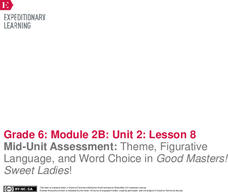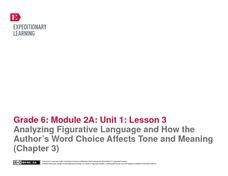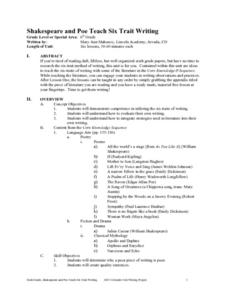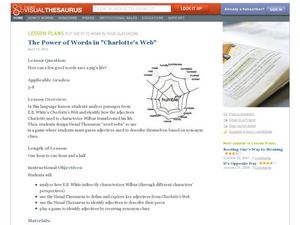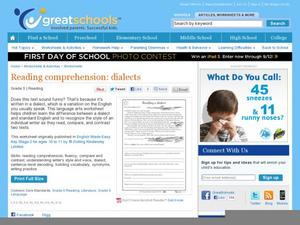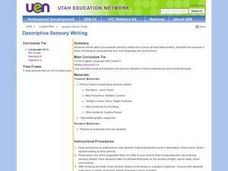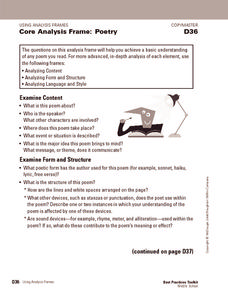EngageNY
Mid-Unit 1 Assessment: Figurative Language and Word Choice in Bud, Not Buddy (Chapter 5)
Individuals utilize the strategies practiced in the previous lesson to complete a mid-unit assessment on figurative language and how Christopher Paul Curtis uses word choice to create meaning in Bud, Not Buddy.
Curated OER
Poetic Word Choice
Groups or pairs choose ordinary objects from a bag and rename them based on traits, so that a stapler becomes a "paper cobra." Then they connect this exercise to the way authors use language to emphasize certain traits through word...
EngageNY
Figurative Language and Word Choice: A Closer Look at Bud, Not Buddy (Chapter 2)
The difference between an average and an unforgettable writing can lie in the author's word choice. The figurative language in Chapter 2 of Christopher Paul Curtis's Newbery Medal Winner, Bud, Not Buddy, is the focus of a series of...
Curated OER
So Much Depends Upon...Sixteen-Word Imagery Poems Inspired by Love that Dog by Sharon Creech
After reading Love That Dog by Sharon Creech (and possibly shedding a few tears), middle schoolers work on their own sixteen-word poems with a Six Trait writing activity. They focus on word choice in this activity to capture an...
EngageNY
Mid-Unit Assessment: Theme, Figurative Language, and Word Choice in Good Masters! Sweet Ladies!
Time to show what you know. Scholars complete a mid-unit assessment to demonstrate their learning from the past lessons. Learners work independently to identify the theme and answer questions about Pask, the Runaway. They also examine...
EngageNY
Analyzing Figurative Language and How the Author’s Word Choice Affects Tone and Meaning (Chapter 3)
How figurative language affects the tone and meaning in Chapter Three of Christopher Paul Curtis' Bud, Not Buddy is the focus of a series of exercises that ask readers to locate, record, and analyze Curtis' word choices.
Curated OER
The Tell-Tale Hearts of Writers
Knock, knock, knock...Creep out your class with a critical thinking lesson focused on word relationships in Edgar Allen Poe's "The Tell-Tale Heart." They investigate the relationship between word choice, mood, and interpretation of a...
Curated OER
Shakespeare and Poe Teach Six-Trait Writing
A Six-Trait Writing instructional activity helps your middle schoolers liven up their word choice and shows them how to evaluate their own writing. Class members take a close look at the language used in poems by Shakespeare, Kipling,...
Curated OER
Compare and Contrast Poems vs. Lyrics
Combine your pupils' love of music with their growing knowledge of poetry! First, have them bring in their favorite songs for a discussion on word choice and literary devices. Then, use a Venn Diagram to compare and contrast the...
Curated OER
The Power of Words in Charlotte's Web
"How can a few good words save a pig's life?" Posed with this question, your ELD students explore E.B. White's Charlotte's Web in a meaningful, valuable way. By analyzing specific word choice from the book, especially the excerpts...
Curated OER
"Knot" the Whole Truth: Writing a Modern-Day Story with a Tall Tale's Voice
Beyond Paul Bunyan and his blue ox, tall tales can be a great way to teach young writers about word choice and voice in their writing. Using Jerry Spinelli's Maniac Magee and the Six-Trait Writing process, they begin to write their own...
Curated OER
Reading a Dialect
Reading a dialect can be difficult; show readers that it can also reveal fascinating details! They read two extracts from Jane Gardam's The Hollow Land, which is written in a British dialect. Readers answer comprehension questions,...
E Reading Worksheets
Tone Worksheet 2
The beauty of a poem is lost without an understanding of its tone. Middle schoolers connect author's purpose and word choice to four poems in a literary analysis activity, which prompts them to note each poem's tone and meaning.
Curated OER
Strong Descriptive Writing: James and the Giant Peach
Support your writers! Clear procedures and appropriate support make this a superb resource for elementary writing instruction. Ready your class to compose original descriptive paragraphs inspired by the episode in Roald Dahl's James and...
Curated OER
Descriptive Prompt: Precise Language
Incorporate sensory details into a piece of descriptive writing. First, elementary and middle schoolers improve a piece of writing by using precise, vivid language, as well as appropriate word choice. They then listen to a variety of...
Curated OER
Comparing Two Stories
Compare new and old versions of the classic story Alice in Wonderland in this comprehensive worksheet packet. Learners read an excerpt from the original, answering several analysis questions. They do the same for a more modern version,...
Novelinks
The Little Prince: Brainstorming Activity
What do you think of when you hear the word adult? Or friend? Learners brainstorm with a group of peers to list the words they think of when they hear seven words from Antoine de Saint-Exupéry's The Little Prince.
Macmillan Education
Understanding Poetry (Elementary)
Introduce young readers to poetry analysis with a learning exercise that uses Emily Bronte's "Spellbound" to model how poets use word choice, the sounds of words, the repetition of words, and rhyming patterns to create the mood, tone,...
Houghton Mifflin Harcourt
Core Analysis Frame: Poetry
Dig deep into any piece of poetry with a set of analysis questions. Ponder the content, form, and language of poetry and provide some question for critique. The first two pages include general questions, and the remainder of the document...
E Reading Worksheets
Tone Worksheet 3
The interpretation of a poem often lies in the mind of its reader, especially when reading the tone. Focus on author's word choice, middle schoolers read four different poems and briefly state a perceived tone for each, along with the...
Curated OER
Prop Box
What other uses can you brainstorm for a key? What about a pair of sunglasses? Bring a bag of props into your classroom and have learners create different uses for a selection of objects. Then, after everyone has shared, translate the...
EngageNY
Writing: Drafting Body Paragraphs and Revising for Language
Begin the drafting phase of the writing process with a lesson plan focused on logically writing three body paragraphs. Then, revise the writing to make it more formal after a teacher-directed mini-lesson plan. Each paragraph highlights...
Curated OER
Analogies
When you understand the relationships between words, your vocabulary and reading skills will increase! Work on a set of analogies with multiple choices for learners to select.
E Reading Worksheets
Tone Worksheet 1
Discern the tone in four selected poems with a straightforward assignment. Junior high readers analyze the authors' word choice and text structure to define a tone for each poem, as well as each poem's meaning.
Other popular searches
- Improve Word Choice
- Imagery and Word Choice
- Word Choice in Writing
- Vivid Details, Word Choice
- Writing Word Choice
- Revise Word Choice
- Correct Word Use
- Specific Word Choice
- Word Choice Worksheets
- Author's Word Choice
- Vivid Details Word Choice
- Authors Word Choice






